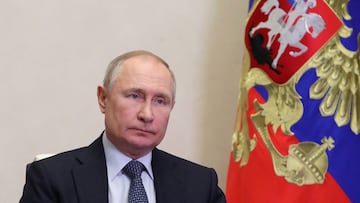Putin’s strategy to end the war, according to an expert
During an interview with ‘The Mirror,’ Andrew Wilson explains that Putin’s victory could involve complete isolation of Ukraine from the Sea of Azov.


As the two month mark of the Russian invasion of Ukraine inches closer, the military offensive continues. In recent days air raid sirens in the western cities of Kyiv and Lviv have been constant as airstrikes continue.
Despite the economic sanctions imposed by the West and fierce resistance from Ukrainian forces, negotiations between the two countries have been fruitless.
After the Ukrainians dealt a severe blow to the Russian navy by sinking the largest warship in their fleet, the Moskva, speculation about when the war could end has increased.
In an interview with radio station RTL, French President Emmanuel Macron mentioned that Vladimir Putin could offer “a day of victory” on 9 May. That date occupies a famous place in Russian history as it celebrates Russia’s victory in World War II.
Officials in the United States, including Secretary of State Anthony Bliken, believe that the end of the conflict could come closer to the end of 2022.
Related: Putin’s strange gesture during ministerial meeting deciphered
Russian military shifts strategy
Russia has been forced to make changes to its strategy. While the initial objective was a complete takeover of the Ukraine, seizing the Donbas region has become the Kremlin’s new focus. In the breakaway regions of Donetsk and Luhansk, Russia has the support of pro-Russian rebels which could aid in its efforts.
Even if Russian forces cannot achieve a military victory, there is still a chance that President Putin would claim one anyway. Currently, Russians are living in a media bubble, unable to access much outside information, giving the Kremlin strong control over the narrative told to their people.
Andrew Wilson, a professor of Ukrainian studies at University College London, explained this scenario in an interview with ‘The Mirror.’ However, in Wilson’s opinion, Putin would need some evidence, which could take the form of a bridge “linking” Crimea and Donbas.
If the Russian forces can make this connection, “Ukraine would be cut off from the Sea of Azov and will lose many of its ports on the Black Sea,” said Professor Wilson.
Whether this would be enough to claim a victory is unknown, but it would show that Russia was able to gain “more territory than it had in 2014, but it is clearly not what Putin wanted when he started the war.”
Achieving this objective would require Russia to capture the besieged city of Mariupol, an epicenter of violence in this war. The once prosperous industrial city has seen nearly ninety percent of its buildings targeted by airstrikes, and civilians have been attacked at hospitals, theaters, and even when trying to escape through humanitarian corridors.
Tensions grow between Russia and Europe over oil and gas supply
There is a political sphere to this conflict that grows tenser as the war rages on. The US import ban on Russian gas and oil imports on the one hand, and EU sanctions on the other, mark another conflict that has been waged in the economic sector.
Given the rise in crude oil and gas prices, Europe has been forced to look for alternative suppliers. President Putin has placed even greater pressure on European leaders, threatening to turn off the supply if they are not willing to make payments for Russian energy resouces in rubles.
“If these payments are not made, we will consider it a failure of the buyer to fulfill its obligations with all the ensuing consequences.”
Related stories
Many European countries are highly dependent on Russian gas.
Gazprom, the Russian energy giant, supplies Europe with more than forty percent of all natural gas consumed within the block. Among the countries most dependent on imports of gas provided by Moscow are Germany, Austria, Bulgaria, Slovakia, and the Baltic republics (Estonia, Latvia, and Lithuania).

